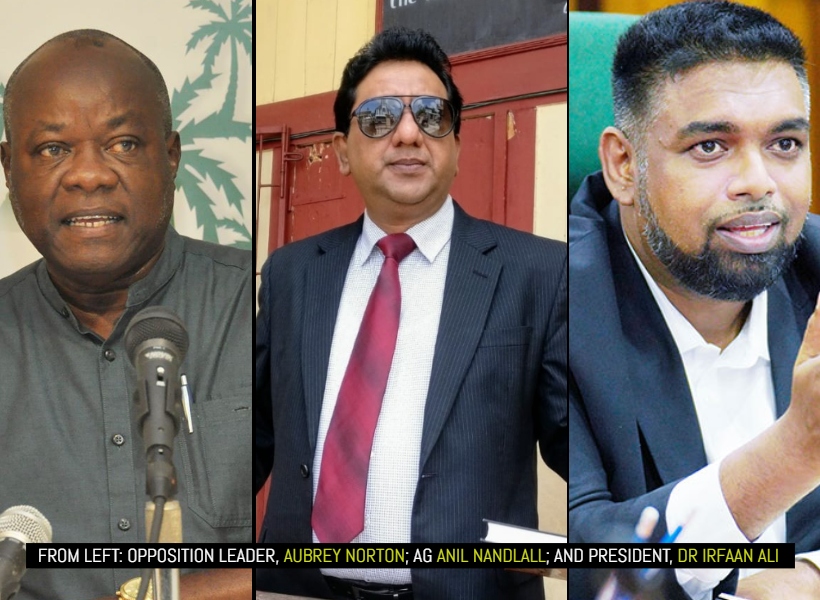A difference in the interpretation of “consultation” is what has the Guyana Government and the Opposition at odds over the selection of persons to serve on at least two constitutionally required service commissions. The government, through its Legal Affairs Minister and Attorney General, Anil Nandlall, is claiming that President Dr Irfaan Ali has satisfied the constitutionally defined parameters for “consultations” with the Opposition Leader, Aubrey Norton. The latter, on the other hand, claims he is being deliberately denied equal participation.
But as far as Nandlall is concerned, “meaningful consultation” was achieved between the duo, despite Norton’s no-show at the second round of engagement that was set for Monday last.
By Tuesday, President Ali had sworn in members of the Integrity Commission and the Police Service Commission (PSC). The swearing-in occurred mere minutes after Norton threatened that he would take legal action against the government if it moved ahead to “arbitrarily” appoint members.
Nandlall, in his “Issues in the News” programme this week said that “consultation” does not mean “agreement”.
He said, “It means that the President must consult with the Leader of the Opposition. The Leader of the Opposition does not have to agree to the names as opposed to the Chancellor and the Chief Justice, where it (the Constitution) specifically speaks to an agreement between the Leader of the Opposition and the President. [But] for these commissions, consultation is what is required. Mr Norton does not seem to understand what consultation connotes…”
“Consultation” or “meaningful consultation”, according to the Constitution, means that “the person or entity responsible for seeking consultation shall identify the persons or entities to be consulted and specify to them in writing the subject of the consultation and an intended date for the decision on the subject of consultation”.
Secondly, the person or entity responsible shall “ensure that each person or entity to be consulted is afforded a reasonable opportunity to express a considered opinion on the subject of the consultation”.
In this case, the “persons or entity responsible” is the President, while the “persons or entity to be consulted” is the Opposition Leader. The AG said that President Ali fulfilled this criterion “to the letter and spirit” of the constitution when Norton was informed about the commencement of the consultation, along with the purpose of the activity and the intended date for the decision on the subject of consultation.
He said that Ali also satisfied the second requirement. Norton did not attend the follow-up meeting and thereby squandered his “reasonable opportunity to express a considered opinion” within the timeframe identified for the decision, Nandlall said.
“We have complied with the constitutional narrative in their letter and spirit,” Nandlall maintained while taking a jab at Norton for suggesting that he will not be summoned at a time or date that is only favourable or convenient to the President.
Norton is on record saying that he was busy and could not attend the follow-up engagement and blames the President for not reconvening that engagement within the agreed-upon seven-day period.
Ali’s failure to hold that meeting within that period was attributed to his participation in an agriculture forum and the country’s independence celebrations.
The Opposition Leader was not satisfied with the explanation, saying that Ali ought to have foreseen these activities and should have adjusted the timing of the second meeting to suit.
Nandlall, however, rubbished Norton’s comment, stressing that the person responsible for the consultation is the President, not the person or entity being consulted (the Opposition Leader). Therefore, it is the president who “runs the show”.
“Mr Norton has this thing completed confused. He believes that he is to direct the consultative process, and I don’t know what type of legal advice he is receiving, because that is not what the constitution provides for and that is not what it contemplates,” the AG noted.













